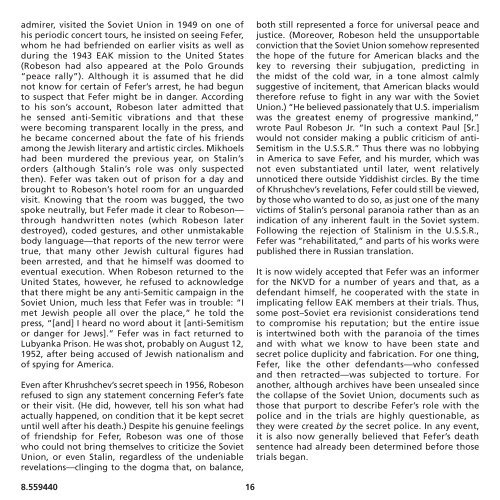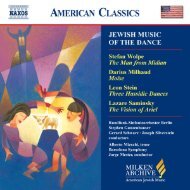Download Liner Notes PDF - Milken Archive of Jewish Music
Download Liner Notes PDF - Milken Archive of Jewish Music
Download Liner Notes PDF - Milken Archive of Jewish Music
You also want an ePaper? Increase the reach of your titles
YUMPU automatically turns print PDFs into web optimized ePapers that Google loves.
admirer, visited the Soviet Union in 1949 on one <strong>of</strong><br />
his periodic concert tours, he insisted on seeing Fefer,<br />
whom he had befriended on earlier visits as well as<br />
during the 1943 EAK mission to the United States<br />
(Robeson had also appeared at the Polo Grounds<br />
“peace rally”). Although it is assumed that he did<br />
not know for certain <strong>of</strong> Fefer’s arrest, he had begun<br />
to suspect that Fefer might be in danger. According<br />
to his son’s account, Robeson later admitted that<br />
he sensed anti-Semitic vibrations and that these<br />
were becoming transparent locally in the press, and<br />
he became concerned about the fate <strong>of</strong> his friends<br />
among the <strong>Jewish</strong> literary and artistic circles. Mikhoels<br />
had been murdered the previous year, on Stalin’s<br />
orders (although Stalin’s role was only suspected<br />
then). Fefer was taken out <strong>of</strong> prison for a day and<br />
brought to Robeson’s hotel room for an unguarded<br />
visit. Knowing that the room was bugged, the two<br />
spoke neutrally, but Fefer made it clear to Robeson—<br />
through handwritten notes (which Robeson later<br />
destroyed), coded gestures, and other unmistakable<br />
body language—that reports <strong>of</strong> the new terror were<br />
true, that many other <strong>Jewish</strong> cultural figures had<br />
been arrested, and that he himself was doomed to<br />
eventual execution. When Robeson returned to the<br />
United States, however, he refused to acknowledge<br />
that there might be any anti-Semitic campaign in the<br />
Soviet Union, much less that Fefer was in trouble: “I<br />
met <strong>Jewish</strong> people all over the place,” he told the<br />
press, “[and] I heard no word about it [anti-Semitism<br />
or danger for Jews].” Fefer was in fact returned to<br />
Lubyanka Prison. He was shot, probably on August 12,<br />
1952, after being accused <strong>of</strong> <strong>Jewish</strong> nationalism and<br />
<strong>of</strong> spying for America.<br />
Even after Khrushchev’s secret speech in 1956, Robeson<br />
refused to sign any statement concerning Fefer’s fate<br />
or their visit. (He did, however, tell his son what had<br />
actually happened, on condition that it be kept secret<br />
until well after his death.) Despite his genuine feelings<br />
<strong>of</strong> friendship for Fefer, Robeson was one <strong>of</strong> those<br />
who could not bring themselves to criticize the Soviet<br />
Union, or even Stalin, regardless <strong>of</strong> the undeniable<br />
revelations—clinging to the dogma that, on balance,<br />
both still represented a force for universal peace and<br />
justice. (Moreover, Robeson held the unsupportable<br />
conviction that the Soviet Union somehow represented<br />
the hope <strong>of</strong> the future for American blacks and the<br />
key to reversing their subjugation, predicting in<br />
the midst <strong>of</strong> the cold war, in a tone almost calmly<br />
suggestive <strong>of</strong> incitement, that American blacks would<br />
therefore refuse to fight in any war with the Soviet<br />
Union.) “He believed passionately that U.S. imperialism<br />
was the greatest enemy <strong>of</strong> progressive mankind,”<br />
wrote Paul Robeson Jr. “In such a context Paul [Sr.]<br />
would not consider making a public criticism <strong>of</strong> anti-<br />
Semitism in the U.S.S.R.” Thus there was no lobbying<br />
in America to save Fefer, and his murder, which was<br />
not even substantiated until later, went relatively<br />
unnoticed there outside Yiddishist circles. By the time<br />
<strong>of</strong> Khrushchev’s revelations, Fefer could still be viewed,<br />
by those who wanted to do so, as just one <strong>of</strong> the many<br />
victims <strong>of</strong> Stalin’s personal paranoia rather than as an<br />
indication <strong>of</strong> any inherent fault in the Soviet system.<br />
Following the rejection <strong>of</strong> Stalinism in the U.S.S.R.,<br />
Fefer was “rehabilitated,” and parts <strong>of</strong> his works were<br />
published there in Russian translation.<br />
It is now widely accepted that Fefer was an informer<br />
for the NKVD for a number <strong>of</strong> years and that, as a<br />
defendant himself, he cooperated with the state in<br />
implicating fellow EAK members at their trials. Thus,<br />
some post–Soviet era revisionist considerations tend<br />
to compromise his reputation; but the entire issue<br />
is intertwined both with the paranoia <strong>of</strong> the times<br />
and with what we know to have been state and<br />
secret police duplicity and fabrication. For one thing,<br />
Fefer, like the other defendants—who confessed<br />
and then retracted—was subjected to torture. For<br />
another, although archives have been unsealed since<br />
the collapse <strong>of</strong> the Soviet Union, documents such as<br />
those that purport to describe Fefer’s role with the<br />
police and in the trials are highly questionable, as<br />
they were created by the secret police. In any event,<br />
it is also now generally believed that Fefer’s death<br />
sentence had already been determined before those<br />
trials began.<br />
8.559440 16<br />
Helfman_<strong>Liner</strong>Nts 9440.indd 16<br />
12/5/05 1:03:55 PM
















